Why Iowa? And what’s a caucus, anyway?
Tonight about 200,000 Iowans will begin the process of selecting the presidential nominees. That number barely surpasses the population of Glendale, but the results will have an enormous effect.
The Iowa caucuses have been closely watched since 1972, when George S. McGovern’s strong performance helped him shoulder past his better-known rivals and win the Democratic nomination.
For years, politicians in states like California have griped about Iowa’s outsized role. But the state has only gained import, to the point where candidates shattered records in 2007 with their campaign spending and wall-to-wall TV advertising in the state.
Why does Iowa go first?
Because for years no one much cared. Iowa has been holding some form of caucuses since the early 1800s. After McGovern’s surprise showing, another long-shot candidate, Jimmy Carter, used the 1976 Iowa caucuses as a springboard to the White House.
Other candidates began heading to Iowa seeking a similar breakthrough. A tradition was established, and once that happened, few wanted to alienate Iowa voters by challenging the state’s primacy. Eventually, Iowa and New Hampshire, which holds the first primary, reached an accord that cemented their one-two placement on the nominating calendar, which has been recognized by the national political parties and, more importantly, those seeking the White House.
What is a caucus?
It’s a gathering of voters at the precinct level. There are 1,781 precincts in Iowa’s 99 counties. A caucus can be held in a community center, a fire station, a library conference room or somebody’s living room.
Who gets to participate?
Anyone who will be 18 years old by Nov. 4, the date of the general election. The two major parties are fairly flexible in their rules. Basically, anyone willing to register with the party on caucus night can participate. There is no entry fee.
How does a caucus work?
The two parties conduct their caucuses differently. Republicans operate in a fairly straightforward fashion. Participants vote by writing their candidate’s name on a blank sheet of paper, or sometimes by a show of hands. Shorthand or nicknames -- “Huck” for former Arkansas Gov. Mike Huckabee, or “Rudy” for former New York City Mayor Rudolph W. Giuliani -- will be counted.
Democrats have a much more complicated system. Participants break into groups based on their preferences. If a candidate fails to reach the “viability” threshold -- at least 15% of the vote -- he or she is eliminated. Supporters of eliminated candidates can fall in with another candidate or go home (though leaving is considered poor caucus form). The voting is done in the open, and debate and persuasion are very much a part of the process.
Sothat’s how Iowa awards its delegates to the presidential nominating conventions?
Actually, no. The caucuses elect delegates to county conventions in March, the first step in a process that will end with the selection of Iowa’s national delegates in June. By then, no one is paying much attention.
Why the fixation on Iowa?
Because it votes first and because the political press corps, the candidates, donors and others who follow politics are desperate after years of campaigning for some measure, however abstract, of popular sentiment.
Given all the attention, an Iowa victory pretty much ensures a candidate will win the nomination, doesn’t it?
Not necessarily. George H.W. Bush and Bill Clinton both finished third in Iowa en route to winning the White House. Republican Bob Dole and Democrat Richard A. Gephardt won their respective caucuses in 1988 and failed to win their parties’ nominations.
On the other hand, in the last two presidential campaigns, Iowa proved decisive for the Democrats, clearing the path for Al Gore and John F. Kerry to win the nomination.
So whoever gets the most votes wins?
Not always. In 1976, Carter actually finished behind “undecided.” But since he came from seemingly nowhere, it was seen as a huge accomplishment. Walter F. Mondale beat Gary Hart 49% to 17% in 1984, but because Hart did better than anticipated he was showered with favorable news coverage that helped propel him to an upset win in New Hampshire. So there is room for interpretation.
“The candidates will be measured against each other as well as the somewhat arbitrary expectations set by the press and pundits,” Democratic strategist Dan Newman said. “As a result, you could see three or four candidates in each party all claiming victory” tonight.
Times researcher Nona Yates contributed to this report.
More to Read
Start your day right
Sign up for Essential California for news, features and recommendations from the L.A. Times and beyond in your inbox six days a week.
You may occasionally receive promotional content from the Los Angeles Times.







